Abstract
It is axiomatic to argue that the future of Low Cost Carriers (LCC) in the Gulf Cooperation Council (GCC) has been a concern to the business community in the recent past. The need to deregulate the air transport within the cooperation is one of the major steps towards improving the operations of LCCs.
Being one of the market leaders; GCC has in the past adopted all the possible mechanisms to liberate the market to enhance quality and affordable services. Through this research, some of the questions which come up when discussing low cost carriers are tackled and they include; the probability of deregulation of air industry coming to GCC and how long it will take.
The impact of integration and how it will change competition between airlines, Role of International community particularly AACO in deregulating the GCC, The development plans of airports in the region and how it supports the growth of LCC, competition strategy, product strategy, marketing and network amongst leading LCCs within GCC carriers, just to mention a few. These areas of scrutiny lead to a number of findings which are discussed in the discussion area in relation to literature. The paper also presents a number of recommendations in relation to the findings of the research.
Introduction
Low cost carriers are considered by many investors as a key variable in improving economic growth and subsequent development in the development. (Jan & Tom, 2000) explains that given the nature of robust business activities within the GCC, it is necessary that it offers low cost carriers to attract the number of investors that flows into the region.
The economic prosperity and continued flourishing business within the region will depend on the cost of doing business. (Suliaman 2011) In the GCC, the cost of doing business is directly proportionate to the carriers charges, thus the topic becomes pertinent in analyzing the future of business.
Before digesting the need for regulation it is prudent to understand some of the reasons for continued regulation. According to (Dempsey & Goetze 1992), when the industry is not regulated, companies with high capital base would lower prices, giving them a superior advantage over her rivals.
A fear of price wars would start leading to a collapse of companies with small capital base. Other observers argue that air transport is a public utility and therefore regulation was necessary to ensure that major benefits are not jeopardized. There are also regions which are neither accessible by road nor water and therefore the best means of transport is air transport. If the private players are left to manage the industry, they might not appreciate the need of connecting and investing into these regions. (Doganis, 2002)
Brief History and Statistics of GCC
GCCs an abbreviation for Gulf Cooperation Council was founded in 26 May 1981. It is also referred to as Arab Gulf Cooperation Council (AGCC). (Griffith, 2002) Members of the GCC also include; Bahrain, Kuwait, Oman, Qatar, Saudi Arabia, and United Arab Emirates. The current Secretary General is Abdullatif bin Rashid Al-Zayani from Bahrain.
The cooperation covers a total area of 2,673,108km2 and an estimated population of 42,100,000 with an approximate density of 17.37km2.The regions nominal GDP by 2011 was $1.386 trillion and per capita of $33,005. Even though the economy has been doing well recent economic down fall drew a lot of criticisms towards the council inadequate participation to avoid this with programs which were prone to disparities.
The adopted plans to bring economy to its level again have been accused of the crowding out effect. The council therefore failed to set clear priorities for growth, undermining economic and social stability in the long run and failing to adopt strategies towards restoring customers and investors’ confidence (World Bank, 2011).
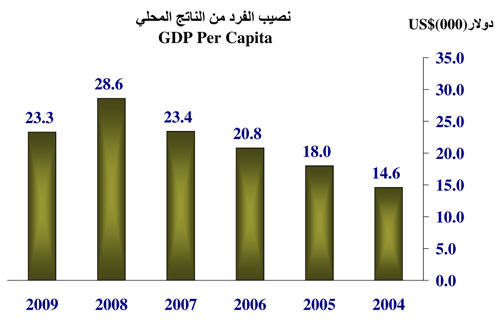
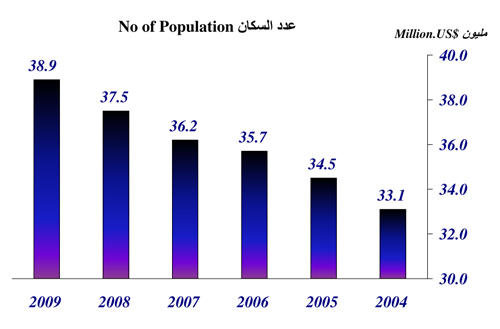
Although Yemen is not a member it lies within the geographical boundaries of the region. It is has already filed an application which was approved by the current member countries. The member countries have all their coast line in the Arabian Gulf.
Some of the key objectives of the federation include;
- Formulating and promoting scientific approach in industries, agriculture mining and water.
- Adopt regulations in fields such as finance, tourism, legislation, administration, trade and customs.
- Establishing joint ventures, building scientific research centers.
- Promoting trade cooperation within the private sector.
- Coming up with a common currency by the year 2010.
- Building strong relationships amongst their people.
- Building a Peninsula Shield force.
GCC members are characterized with faster growing economic models. The economy in most of these countries usually experience boom from oil, natural gas, building and investment revenues. The region in the past has been associated with a number of events including the 2006 Asians games held in Doha, Qatar. Even though it submitted unsuccessful application to host 2016 summer Olympics games, Qatar was later approved to host FIFA 2022 world cup.
The GCC has a common market which was launched in January 2008. The common market removes all trade and investments barriers to citizens and firms within the bloc. Before the agreement on the adoption of a common market there was an establishment of a customs union which was adopted in 2003 though it’s signing took some time. One of the reasons that contributed to this was the Free Trade Agreement which Bahrain signed with US and brought a lot of tension amongst the member countries.
In 2009 part of the member countries, Kuwait, Saudi Arabia, Bahrain and Qatar created a monetary council to identify strategies of creating a common currency to facilitate trade. The council members were skeptical about its creation with the by then Kuwait’s foreign affairs minister Sheikh Mohamed Sabah al-Salem al Sabah predicting a creation of a common currency in 2019.This led to the withdrawal of Oman and United Arab Emirates from the council.
The airlines within the GCC have continued to grow despite a number of challenges it has faced in the past. Some of the challenges include; security concerns, constant increase in the operational costs, increased competition, rising number of tourists, expansion of airports among others. (Forsyth et al, 2004) Liberalization has in the past allowed new entrants in the market and therefore enhancing competition which translates to better service provision.
GCC aviation industry has in the recent past ploughed in billion of dollars to attract investors into the economy. The sector has undergone rapid transformation with the recognition that strong airports are major tools for development. This has led to the creation of a business hub within the area which is supported by very strong airlines.
Qatar with Qatar airways, Dubai with Emirates, Abu Dhabi with Etihad has spent Billions of dollars to ensure expansion of the airports to a first class level. The double digit growth in passenger and cargo demands have also forced Kuwait, Bahrain and Oman to modernize their airports and establish very strong hubs. Currently GCC airports are going rapid overhauls with the construction of new ones.
Some of the major airports in the region include; Bahrain International Airport in Bahrain, Kuwait Airport in Kuwait ,Oman Airport Management Co. SAOC in Oman, Doha International Airport in Qatar, King Abdul-Aziz International airport, King Fahd International airport, King Khalid International Airport, Prince Mohammad Bin Abdul-Aziz Airport and Rafha Domestic Airport in Saudi Arabia, Abu Dhabi Airports Co., Dubai International Airport, Fujairah International Airport, Rash Al Khaimah International Airport LLC, Sharjah International Airport in United Arab Emirates.
The latest five major construction and expansion which have been identified from the region includes; Upgrading of the King Abdul-Aziz International Airport in Jeddah at a cost of roughly $6.7 Billions, Al Maktoum International Airport, Dubai at accost of $33 Billion, Abu Dhabi expansion, Prince Mohammed Bin Abdul-Aziz Airport to handle a passenger traffic of 32 Million from the previous 7 Million, Madinah at a cost of $2.4 Billion and finally New Doha International Airport, Qatar at an approximated cost of US $11 billion to handle over 50million passengers. (O’Connell, 2011).
(Fromherz 2012) The GCC has got a number of Airlines. Those within Bahrain include; Bahrain AIT 2008, DHL International Aviation ME, 1979, Gulf Air 1950 and Swift air Bahrain 2008. Airlines in Kuwait are Jazeera Airways 2005 and Kuwait Airways 1989. Airlines in Qatar include; Gulf Helicopters, 1970,Qatar Airways 1993,Qatar Amiri Flight 1977,Qatar Executive 2009, Airlines in Saudi Arabia include; Al ANWAR Aviation, ASACO, Dallah AVCO 1975, Mid East Jet 1990, NAS Air 2007, Saudi and SNAS Aviation.
United Arab Emirates has the highest number of Airlines in the regions which include; Abu Dhabi Aviation, Aero Vista, Air Arabia, Air Cess, Al jabber Aviation, Al Rais Cargo, AVE.com, British Gulf International Airlines, Cargo Plus Aviation, Click Airways, Daallo Airways, Dolphin Air, Dubai Royal Air wing, Eastem Sky jets , Emirates Airline, Emirates Sky Cargo, Etihad Airways, Etihad Crystal Cargo, Falcom Aviation Services, Fly Dubai, Heavy lift international, Jet Set Cargo, Jupiter Airlines, Kinshasa Airways, Kurdistan Airlines, Maximum Air, Midex Airlines Palm Aviation, RAK Airways, Royal Jet, Reem Air among others. (The Cooperation Council of Arab States 2012)
Background of the Study and Purpose of the Study
The future of low cost carriers is a very important topic which cannot be assumed by the leaders of GCC region. (Doganis, 2002) The concept of low cost carriers began in 1970s by the American domestic carrier south west which penetrated the market through low prices it was charging. In Asia there were a number of restrictions and regulations which would not easily allow the penetration of low cost carriers.
The pressure from congested airports, need to promote tourism, trade and the rapid demographic and economic performance convinced the government to remove some of the regulations hence allowing the concept of low cost carriers. (Bailey, 2008)The success of the low cost carriers can be attributed to the strategy of a low cost leadership whose goal is to charge lowest costs possible relative to its rivals in the market, through a sustainable cost competitive advantage to the rivals.
The major factor to be considered in this model is that a cost is not similar to the price charged. Various models are currently being adopted, though facing challenges, the relevant authority must work towards its excellence. The discussion of the current state of the low cost carriers and the effectiveness and the efficiency towards meeting client’s needs is pertinent. When discussing the future of low cost carriers, there are a number of questions which crop up.
The purpose of this research is therefore to lead us into a better understanding of the issues surrounding the future of the low cost carriers within GCC through answering the vital questions which crop up in its discussion. This basically entails establishing the issues of integration and deregulation of the Air Transport Industry and how the low costs carriers will continue to improve the economic growth and prosperity in the region. The study also seeks to analyze the role of airports in supporting low costs carriers within the region besides analyzing the role of international organizations such as AACO in deregulating the GCC. (Teodorovic, 1988)
Methodology
In order to complete this research successfully, there are different aspects of methodology which were put into use. One of them was the selection of the participants who were mostly players in the air transport industry and business men. Few participants were also drawn from the GCC head offices and government offices.
The total number of participants was 10 and they had structured questionnaires emailed to them to ensure that they got the chance to participate in the study. The questionnaires which were sent to the participants were later received and the information collected is presented on in this paper in the results section. The questionnaires were mainly used to collect primary data but there are other ways through which data was collected.
Information was also collected from secondary sources of information which mainly included books and journals. The data collected in the secondary sources as presented earlier makes it possible to compare what has been written and the information which was collected first hand through the questionnaires. Apart from these there was also a plenary discussion with 5 businessmen through which it was possible to gain more insights on the research question.
Data Analysis
The data provided below is the information collected from the participants
The first question which the participants were presented with was on the necessity of deregulating air transport industry and how soon should it be. This was an open ended question and the participants had the chance to answer by presenting their own thoughts which were as follows.
One point that came clear was that the deregulation of the air transport industry should have been done long time ago. Air Transport Participant 4 emphasized that the deregulation would encourage competition which will translate to quality services being offered to loyal clients.
Government participant 10 explained that the government is on point to enact the proposal to challenge the old age dogma that believes that air transport should be regulated. The participant also explained that all the GCC countries except Saudi Arabia have signed some form of open skies agreement. The tremendous economic growth which has been experienced in the region has encouraged the urge for the adoption of deregulation proposal.
The second question which was presented to the participants required them to express their views on the impact of GCC integration and whether it will be the beginning of deregulation. There were a number of varied opinions, but one thing that stood out was that integration of GCC has and will bring a lot of economic and social benefits to the people, business community and the existing air lines in the region.
GCC participant 8 reiterated that increase Foreign Direct Investments in the past and the projected results can only be possible when there is integration within the GCC area. Businessmen participant 7 had rather a different when it came to integration. The participant believed that firms should remain independent to enhance the level of competition.
The third question tacked the effectiveness and reliability of the integration and subsequent deregulation in enhancing competition amongst airlines. The question predominantly led to a good modal score, meaning that competition is dependent on integration within the region.
The fourth question focused on whether airports support growth of LCCs in the region and how they were doing it. All the responses indicated strongly agree meaning that there was a unilateral opinion that airport increased the growth of LCCs in the region. GCC participant 8 indicated that the current expansion in the airports in almost all the GCC countries will promote the expansion of LCCs.
The fifth question on the classification of the current impact of airports on the growth of LCCs. The responses indicated poor meaning that the current capacity of the airports has not given enough room for the operations of LCCs. According to the Air Transport Participant 1, most of the leading airports in the region still require a lot of expansion. He reiterated that when the capacity is increased then it will be easier for the LCCs to operate and compete well.
The sixth question asked participants whether the growth of full service airlines is better as compared to the growth of LCCs in the region. There was a bit funny trend as all the response from the Air transport indicated and strong disagrees while the remaining participants indicated strongly agree with exception of one participant who was undecided. From the data it is worth noticing that most of the growth of full service airlines is better. GCC participant 9 indicated that a lot of capital investments within the full service airlines can be floated as the responsible reason for this.
Open Plenary discussions
The plenary discussions which were held included businessmen men operating within GCC and depended on the air transport industry in doing their business. The first question posed to them was the role of international organizations, specifically AACO in deregulating the GCC.
The panelists argued that most of the international organizations have not put enough pressure on the deregulation of the GCC. One panelist for instance, reiterated that the deregulation of the airline transport ought to have been done more than a decade as a way of liberating the economy. AACO, they argued, should be very swift in ensuring that enough pressure is put on GCC so as to adopt the agreements on deregulation. They explained that it is one of the fundamental ways through which the economy can grow.
The panel was also led to a discussion on the on the various strategies in terms of marketing, network, and product so as to compete with the full service carriers. One panelist argued LCCs favorable prices can be more than appealing to the market and therefore will attract large number of customers. ‘Identification of specific line of clients is very important if the business yearns to grow’ said a panelist.
He continued that identification of unique products which is customized according to the clients requirements will give them an easy way to compete with their rivals. While appreciating the meager capital base of the LCCs, a member argued that acquisitions and mergers can be a good strategy for the firms to penetrate the market.
Findings and Discussions
Through the data that was collected and analyzed as presented above there are a number of findings which were established. One of the most important finding was the benefits of deregulation. All the responses pointed out that competition which is due to deregulation leads to the benefits of customers in terms of low prices and quality. It is clear from the results obtained that the future of LCCs within the GCCs is bright since stakeholders have borrowed the idea. It was further noticed that various organizations including the governments have been reluctant in ensuring the achievement of this.
Discussion
The analyzed data has shown that deregulation in airlines leads to reduction in fares due to increased competition as more airlines access the market. Through competition better and quality services can be offered to the client. This finding is supported by (Bailey et al, 2008) who says that deregulation will enhance the participation of LCCs within the country which makes the future be bright. With the improved business activities within the region and given that GCC being one of the leading cooperation’s in the air transport there is need for an adoption of the agreements to deregulate the economy. (O’Conner 2001)
(Forsyth, 2006) argues that the introduction of LCCs has also played a role in promoting economic development in the region. There are a number of businessmen who are willing to use the air transport but cannot due to its cost. LCCs will increase the number of people who are jetting into the region. Practicing market discrimination will lead to the successful operations of the LCCs.
In discussing the future of LCCs within the region the findings have proved that the necessary parameters must be put in place. (O’Connell 2011) Willingness amongst the key players in the industry is very important towards the adoption of this. Even though Saudi Arabia is still pessimistic about the security in the region, it is worth noticing that the economic growths of the region will flourish. The integration of GCCs will also enhance the expansion and operations of the LCCs within the region.
Graphs
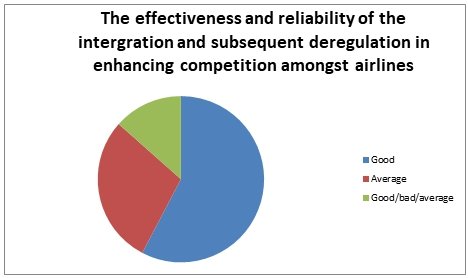
The graph showing the effectiveness and reliability of the integration and subsequent deregulation in enhancing competition amongst airlines
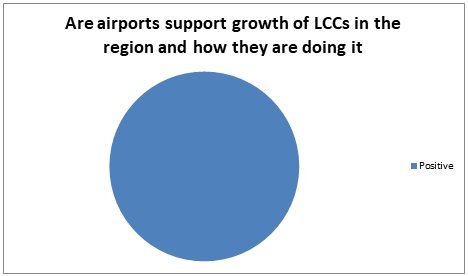
The graph indicating whether airports support growth of LCCs in the region and how they are doing it
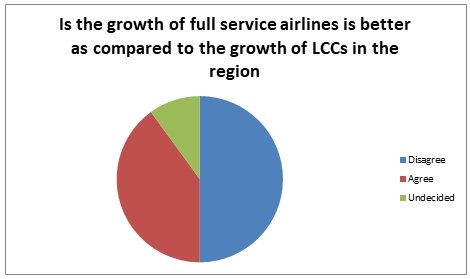
Graph showing whether there is growth of full service airlines is better as compared to the growth of LCCs in the region
Conclusions
The future of low cost carriers is unarguably important issue to the business community. Within GCC it is a big concern. The trends in the business sector have proven that better services are provided when the government allows room for free and fair competition. The need for deregulation of the air transport industry will not only liberate the company but also increase the number of Foreign Direct Investments (FDIs).
From the research it is clear the there a unanimous agreement on the need for an urgent deregulation of the industry to enhance competition. If this is not done then the region will be headed to formation of cartels who will not only exploit the clients but also to monopolize the market. This research paper is optimistic that with the deregulation of the economy, will increase operations of the LCCs.
Recommendations
In view of the findings presented above, I would recommend the following:
- The deregulation of the air transport industry in the GCC. As explained in the paper it will liberate the economy and subsequently allow healthy competition within the economy.
- The LCCs should adopt relevant market, product and price strategies which can facilitate their penetration into the market which is already monopolized by firms having high capital base.
- The international community specifically AACO should play an active role towards luring the GCC members to deregulate the air industry.
References
Bailey, E., David R. Graham and Daniel P. Kaplan.2008 Deregulating the Airlines. MIT Press
Dempsey, P., S. and Goetze A. R. 1992, Airline Deregulation and Laissez- Faire Mythology; Greenwood Publishing Group.
Doganis, Rigas 2002, Flying off course: The Economics of International Airlines (3rd Edition).Harper Collins Academic
Forsyth Peter, John King, Cherry Lyn Rodolfo and Keith Trace. 2004, Preparing ASEAN for open sky. AADCP Regional Economic Policy Support Facility Research Project 02/008.
Forsyth Peter, John King and Cherry Lyn Rodolfo.2006 Open Skies in ASEAN. A Journal of air transport management.
Fromherz A.,J., 2012, Qatar: a modern history. I.B. Tauris: London
Griffith A. 2002 GCC, the complete reference, McGraw-Hill/Osborne: New York
Jan K. Brueckner and Tom Whalen The Price Effects of International Airline Alliances. Journal of Law and Economics, Vol. 43, No.2 (October 2000),pp.503-546
O’Conner, William E. 2001 An Introduction to an Airline Economics (6th Edition) Green wood Publishing group
O’Connell, John. 2011 The rise of Arabian Gulf Carriers: An insight into the business model of Emirates Airline. Journal of Air Transport management.339-346
The Cooperation Council of Arab States; 2012, Statistics
Suliaman Saed. 2011, The feasibility of Linearization or deregulation of Air Transport industry
The World Bank. 2011, Economic Integration in the GCC; the World Bank
Teodorovic, Dusan 1988, Airline Operations Research (1st Edition). Gordon and Breach Science Publishers